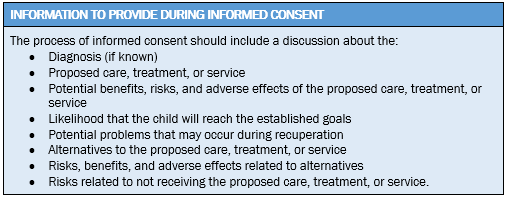Inform Consent and Assent in Pediatric Patients
Obtaining informed consent provides an opportunity for mutual understanding between a child's parents or guardians (or a legally emancipated minor) and the practitioner or other health care provider about the care, treatment, and services that the child will receive. Informed consent involves educating the parents or guardians (and child, as applicable) and taking into consideration the child's needs and the parents' or guardians' preferences. It also involves compliance with laws and regulations. The informed consent process helps the parents or guardians (and child as applicable) participate fully in decisions about the child's care, treatment, and services.
The practitioner should also teach the child (if developmentally appropriate) about the medical condition involved and any associated care, treatment, and services. The practitioner should obtain the child's assent to care, treatment, and services as part of the joint decision-making process whenever possible.

The practitioner must evaluate whether the parents or guardians understand the information provided and accept the associated risks. The parents or guardians must then sign an informed consent form to proceed with the treatment.
The practitioner should seek the permission of the child's parents or guardians in most situations; however, the practitioner must also focus on providing appropriate care and should be prepared to seek legal intervention when the parent's or guardians' refusal to provide informed consent places the child at clear, substantial risk.